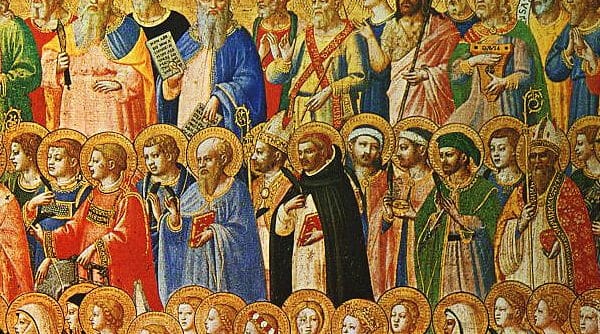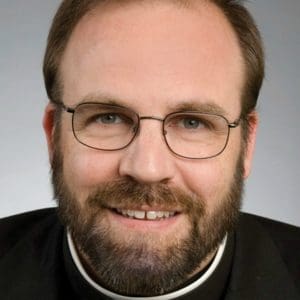Some saints of the Church have a particular day on the calendar associated with them and are commonly recognized by name. Many more, though not as familiar to us, are still known by God and have been caught up with Him to glory. All Saints Day is their day, the day of the countless multitude who have made it home to glory by God’s grace and by their “Amen” to the gracious call of God. Let’s consider these saints under three headings, based on today’s readings.
I. Their Privileged Place: The first reading for the feast day, from Revelation, speaks to us of saints: from every nation, race, people, and tongue. They stood before the throne and before the Lamb, wearing white robes and holding palm branches in their hands. They cry out in a loud voice, “Salvation comes from our God, who is seated on the throne, and from the Lamb.” … They prostrated themselves before the throne, worshiped God, and exclaimed, “Amen. Blessing and glory, wisdom and thanksgiving, honor, power, and might be to our God forever and ever. Amen.”
Note how liturgical the description is. In fact, the most common way that Heaven is described is in liturgical imagery. The liturgy is a kind of “dress rehearsal” for Heaven. To those who find Mass “boring,” this description can be challenging.
Indeed, many people today have rather egocentric notions of Heaven. Heaven is a place where I will be happy, where I will see my family, where I will take leisure. I will have my mansion; I will no longer get sick; I can play all the golf I want, etc. Heaven is a “better place.” But this better place is generally understood in very personal terms; it’s a kind of “designer Heaven.” But Heaven is what it is, not what we conceive it to be.
As for the real Heaven, the heart of it is being with God, looking upon His glorious face and thereby having all our inexpressible longings satisfied. In Heaven, the saints behold the glorious face of God and rejoice. It is their joy to praise Him and to rejoice in His truth, goodness, and beauty.
Note, too, both the sense of communion of the saints with God and with one another. The biblical portraits present a multitude, a vast crowd. The biblical way to understand the multitudes in Heaven is not to envision physical crowding but rather deep communion. In other words, the Communion of Saints is not just a lot of people standing around talking or moving about.
St Paul teaches, So we, who are many, are one body in Christ, and individually members, one of another (Rom 12:5). And though we experience this imperfectly here on earth, we will experience it perfectly in Heaven. As members of one another, we will have deep communion, knowing and being known in a deep and rich way. Your memories, gifts, and insights will be mine, and mine will be yours. There will be profound understanding and appreciation, a rich love, and sense of how we all complete one another and are one in Christ.
Imagine the glory of billions of new thoughts, stories, and insights that will come from being perfectly members of Christ and of one another. Imagine the peace that will come from understanding and being understood. This is deep, satisfying, wonderful communion—not crowds of strangers.
St. Augustine had in mind the wonderful satisfaction of this deep communion with God and with one another in Christ when he described Heaven as Unus Christus amans seipsum (One Christ loving Himself). This is not some selfish Christ turned in on Himself. This is Christ, the Head, in deep communion with all the members of His body. This is all the members in Christ experiencing deep mystical communion with Him and one another, all swept up into the life of the Trinity. Again, as St. Paul says, and you are Christ’s, and Christ is God’s(1 Cor 3:23).
II. Their Prize of Perfection: The second reading for the Feast, from the First Letter of John, says, Beloved, we are God’s children now; what we shall be has not yet been revealed. We do know that when it is revealed we shall be like him, for we shall see him as he is.
We cannot even imagine the glory of the saints in Heaven. The Heavenly Father once said to St. Catherine that if she were ever to see a saint in his or her transformed heavenly glory, she would fall down and worship because she would think she was looking at God.
This is our future, if we are faithful. We will reflect the glory of God and be transformed by the look of love and glory. Just one look, and oh, the glory we will reflect, God’s very own glory!
III. The Picture to Ponder: The Gospel today (the Matthean beatitudes) sets forth a kind of picture of what sanctity looks like. The beatitudes are the description of the transformed human person; they describe what happens to us as Jesus begins to live His life in us through the Holy Spirit.
This picture is not one that merely waits for Heaven, but one that is true of us even now as we grow into the likeness of Christ.
I have written more on the beatitudes HERE and HERE. For the purposes of today’s feast, we need to acknowledge that a beatitude is not something we do but rather something we receive. A beatitude declares an objective reality as the result of a divine act.
The present indicative mood of the Beatitudes should be taken seriously and not transformed into an imperative of exhortation, as though Jesus were saying, “Start being poor or meek and then God will bless you.” Rather, He is saying that when the transformative power of the cross brings about in us a greater meekness, poverty of spirit, and so forth, we will experience that we are being blessed.
Beatitude is a work of God and results when we yield to His saving work in us. We are blessed when we accept and yield to the work that God alone can do. With this understanding, we see the beatitudes not as a prescription of what we must do per se, but as a description of what a human being is like whom Jesus Christ is transforming into a saint! And this transformation is a growing, stable, deep, and serene beatitude and holiness.
Therefore, the feast of all saints does not merely point to the completed saints in Heaven, but to us who would be saints, not just someday in the future but beginning now and in increasing degree.
At the end, there will be saints and ain’ts. Which do you choose?
_____________________________________________
This post was originally published on Community in Mission and is reprinted here with permission.





